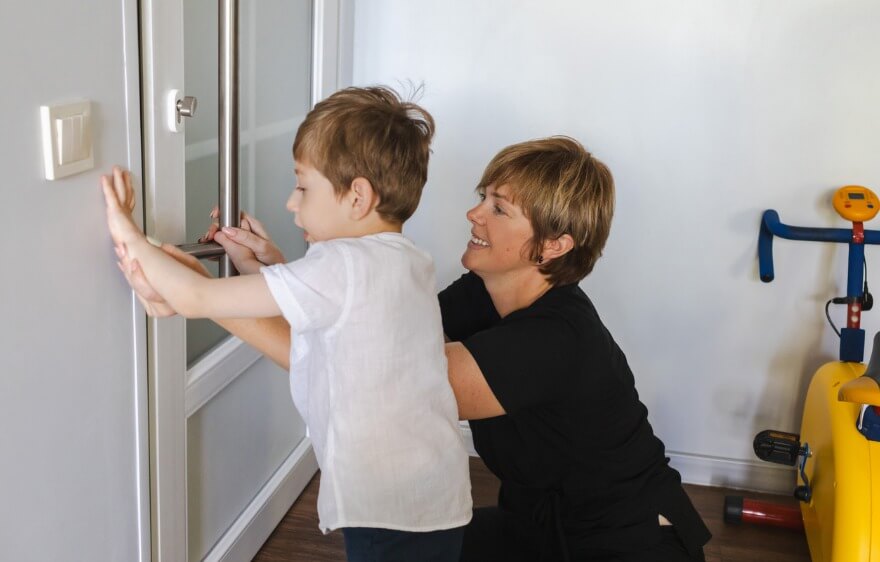What is occupational therapy?
Occupational therapy (OT) is a type of healthcare that focuses on helping individuals develop, recover, or maintain the skills needed for daily living and working. For children, OT can be particularly beneficial in addressing a wide range of developmental, physical, and cognitive conditions. Occupational therapists work with kids to improve their ability to perform daily activities, enhance their independence, and boost their overall quality of life. Using a holistic approach, OT aims to enable children to participate fully in school, play, and daily routines. In this blog, we’ll cover 10 of the most significant benefits of occupational therapy for kids!
Conditions Occupational Therapy Helps
There are many benefits of occupational therapy for children with various conditions, including:
- Developmental Delays: Children who are behind in reaching developmental milestones can benefit from OT. Therapists use play-based activities to enhance motor skills, cognitive abilities, and social interactions.
- Autism Spectrum Disorder (ASD): OT can help children with ASD develop essential life skills, improve sensory processing, and enhance social communication.
- Sensory Processing Disorders: Children with difficulty processing sensory information can benefit from OT interventions that help them manage sensory inputs more effectively.
- Attention Deficit Hyperactivity Disorder (ADHD): OT can assist children with ADHD in developing strategies to improve focus, organization, and self-regulation.
- Physical Disabilities: OT helps children with physical disabilities improve their strength, coordination, and ability to perform daily activities.
- Learning Disabilities: OT can benefit children with learning disabilities by improving their fine motor skills, organizational abilities, and classroom participation.
- Down Syndrome: OT supports children with Down syndrome in developing motor skills, self-care abilities, and social interactions.
- Cerebral Palsy: OT helps children with cerebral palsy enhance their motor skills, coordination, and independence in daily activities.
- Traumatic Injuries: Children recovering from injuries such as spinal cord injuries or brain injuries can benefit from OT to regain their functional abilities.
10 Benefits of Occupational Therapy for Kids
Occupational Therapy offers numerous benefits that can significantly enhance a child’s development and daily functioning. Here are some of the key benefits of occupational therapy:
1. Improved Motor Skills
OT helps children develop fine and gross motor skills. Activities designed to improve hand-eye coordination, dexterity, and muscle strength enable children to perform tasks such as writing, buttoning clothes, and playing sports more effectively. Improved motor skills also contribute to better balance and coordination, which are essential for physical activities and play.
2. Increased Independence
One of the primary goals of OT is to foster independence. By teaching children how to manage daily tasks, such as dressing, feeding, and personal hygiene, OT empowers them to take care of themselves with minimal assistance. This independence boosts their self-confidence and prepares them for future responsibilities.
3. Enhanced Sensory Processing
OT provides strategies and activities to help children with sensory processing disorders manage sensory inputs. This can include techniques to cope with sensitivity to sounds, textures, or lights, allowing them to engage more comfortably in their environments. Improved sensory processing helps children focus better in school and participate more fully in social activities.
4. Strengthened Muscles and Coordination
Occupational therapy includes exercises and activities that build muscle strength and improve coordination. This is especially beneficial for children with physical disabilities or those recovering from injuries. Stronger muscles and better coordination enable children to participate in physical activities and sports, promoting overall health and fitness.
5. Better Cognitive Skills
OT can enhance cognitive abilities by incorporating problem-solving tasks, memory exercises, and activities that improve attention and focus. These skills are crucial for academic success and everyday functioning. Enhanced cognitive skills help children perform better in school, complete homework efficiently, and develop critical thinking abilities.
6. Social and Communication Skills
Occupational therapists often work on social interaction and communication skills. This includes teaching children how to express themselves, understand social cues, and positively interact with peers and adults. Improved social skills help children build friendships, work effectively in group settings, and confidently navigate social situations.
7. Improved Self-Esteem and Confidence
Achieving goals in OT can significantly boost a child’s self-esteem and confidence. As children learn new skills and gain independence, they feel more capable and confident in their abilities. Increased self-esteem encourages children to try new activities, take on challenges, and develop a positive self-image.
8. Support for Families
Occupational therapists also provide valuable support and education for families. They offer guidance on creating supportive home environments, managing challenging behaviors, and incorporating therapeutic activities into daily routines. Family involvement is crucial for reinforcing the skills learned in OT and ensuring the child’s progress continues at home.
9. Customized Care Plans
OT services are tailored to meet each child’s unique needs. Therapists develop personalized care plans that address specific challenges and goals, ensuring that therapy is both effective and engaging. Customized care plans provide targeted interventions that maximize the child’s progress and address their individual needs.
10. Enhanced Academic Performance
By improving fine motor skills, cognitive abilities, and sensory processing, OT can positively impact a child’s academic performance. Children who struggle with handwriting, concentration, or classroom behavior can benefit greatly from targeted OT interventions. Improved academic performance leads to better school experiences and greater opportunities for future success.
Real-Life Examples and Case Studies
To further illustrate the benefits of occupational therapy for kids, consider these real-life examples:
- Case Study #1: A child with autism spectrum disorder (ASD) who struggled with sensory overload and social interactions. Through targeted OT interventions, the child learned coping strategies for managing sensory inputs and improved their ability to communicate and interact with peers. The child became more comfortable in social settings and developed stronger friendships.
- Case Study #2: A child with cerebral palsy who had difficulty with motor coordination and daily self-care tasks. OT helped the child develop stronger muscles, better coordination, and greater independence in activities such as dressing and feeding. The child gained confidence in their abilities and became more self-reliant.
- Case Study #3: A child with ADHD who had trouble focusing and staying on task in school. Occupational therapy provides tools and techniques for improving attention and organizational skills, leading to better academic performance and reduced classroom disruptions. The child became more engaged in learning and achieved higher grades.
How To Access Occupational Therapy for Your Child
If you believe your child could benefit from occupational therapy, consider the following steps:
- Consult with a Pediatrician: Speak with your child’s pediatrician about your concerns. They can refer you to an occupational therapist and help determine if OT is appropriate for your child’s needs. Your pediatrician can also offer insights into the specific areas where OT may benefit your child.
- Find a Qualified Occupational Therapist: Look for licensed occupational therapists specializing in pediatrics. You can find therapists through healthcare networks, local clinics, or online directories. Ensure the therapist has experience working with children and is familiar with your child’s specific condition.
- Understand Your Insurance Coverage: Check with your insurance provider to understand your coverage for OT services. Ensure you have the necessary referrals and authorizations to maximize your benefits. Understanding your insurance coverage helps you plan for the costs associated with OT and avoid unexpected expenses.
- Set Goals and Monitor Progress: Work with the occupational therapist to set specific, measurable goals for your child’s therapy. Regularly review progress and adjust the therapy plan as needed to ensure your child is making meaningful improvements. Setting goals provides a clear direction for therapy and helps track your child’s progress over time.
- Create a Supportive Environment at Home: Reinforce the skills learned in OT by creating a supportive environment at home. Encourage your child to practice new skills and provide positive reinforcement for their efforts. Engaging in therapeutic activities at home helps maintain progress and ensures the child continues to develop their abilities.
The benefits of occupational therapy for kids are extensive, encompassing physical, cognitive, and emotional development. By addressing individual needs and challenges, OT helps children achieve greater independence, improved motor skills, enhanced sensory processing, and better social interactions. These benefits contribute to a child’s immediate well-being and set the stage for long-term success and a higher quality of life.
Our OTs Help Change Lives
If you believe your child could benefit from occupational therapy, consider consulting with a Care Options for Kids pediatric OT. They can assess your child’s needs and develop a customized therapy plan to support their growth and development. The benefits of occupational therapy will make a huge difference in your kiddo’s life, helping them reach their full potential and thrive in their daily activities. Are you ready to watch your child thrive?
Schedule Your Child’s Care Assessment Today
At Care Options for Kids, we understand the unique challenges of caring for a child with health conditions. Our dedicated team of pediatric home health nurses is here to support your family with compassionate, expert care tailored to your child’s needs. Contact us today to schedule an assessment and learn how we can help you navigate this journey with confidence and care.
Click here to start your journey to better care.






